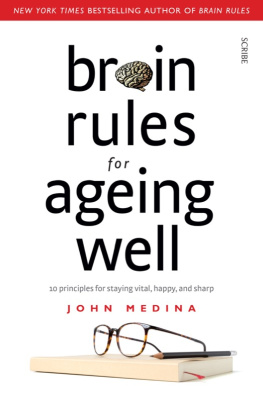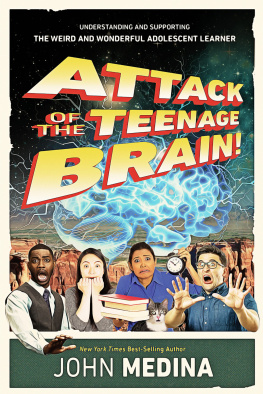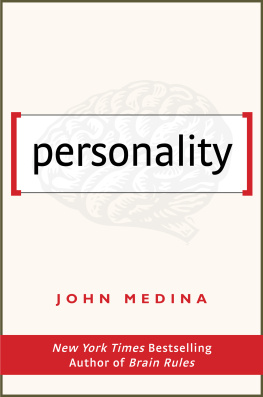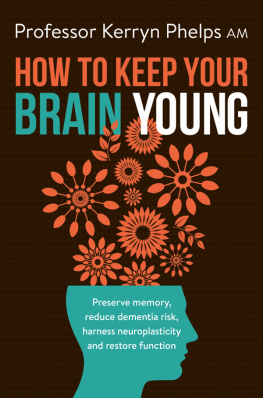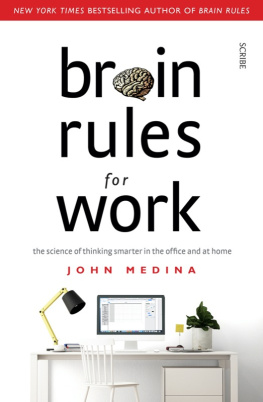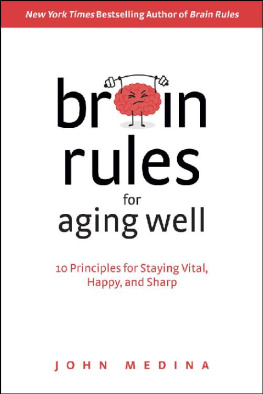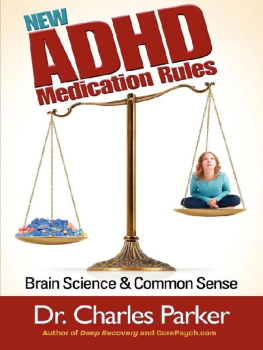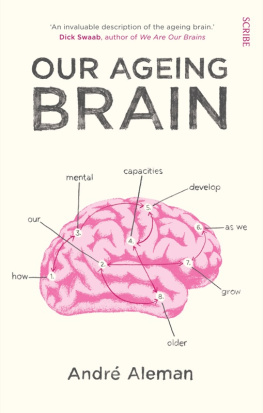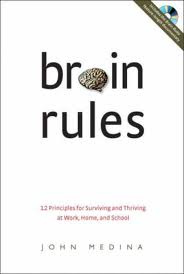
BRAIN RULES FOR AGEING WELL
John Medina is a developmental molecular biologist and research consultant, and he is an affiliate professor of bioengineering at the University of Washington School of Medicine. He was the founding director of two brain research institutes: the Brain Center for Applied Learning Research, at Seattle Pacific University, and the Talaris Research Institute, a nonprofit organisation originally focused on how infants encode and process information. Dr Medina lives in Seattle, Washington, with his wife and two boys.
Scribe Publications
1820 Edward St, Brunswick, Victoria 3056, Australia
2 John St, Clerkenwell, London, WC1N 2ES, United Kingdom
First published by Scribe 2018
Published by arrangement with Pear Press, Seattle, USA
Copyright 2017 by John J. Medina
All rights reserved. Without limiting the rights under copyright reserved above, no part of this publication may be reproduced, stored in or introduced into a retrieval system, or transmitted, in any form or by any means (electronic, mechanical, photocopying, recording or otherwise) without the prior written permission of the publishers of this book.
The moral rights of the author have been asserted.
9781925322903 (paperback edition)
9781925548860 (e-book)
A CiP record for this title is available from the National Library of Australia.
scribepublications.com.au
scribepublications.co.uk
To Sir David Attenborough,
role model and mentor-at-a-distance,
for the continual reminder that science doesnt make truces with truth.
contents
what causes us to age ~ how the brain is wired ~ why old age can be some of the happiest years of your life
Social Brain
vitamins for the brain ~ more parties, less flu ~ where social isolation leads ~ video chats ~ the human touch
happier or grumpier? ~ roller-coaster grandpa ~ gullibility and the Highway to Hell ~ dopamine and depression ~ the power of gratitude
Thinking Brain
the thermostat of the stress system ~ how you feel about ageing changes the way your brain ages ~ gender differences ~ stress and mindfulness
many types of memory ~ what declines, what stays robust, what improves how the brain battles back ~ Mikey likes it, and you will too
how processing speed changes ~ problem-solving abilities vs. intelligence drawn from experience ~ stunning results from playing video games
what your doctor cant tell you ~ mild cognitive impairment vs. Alzheimers 10 warning signs ~ the amyloid hypothesis and the Nun Study ~ predicting Alzheimers in your 20s?
Body and Brain
a little exercise goes a long way ~ less food, longer life? ~ two diets that improve working memory and lower the risk of Alzheimers
why do we sleep? two breakthroughs ~ the battle of the sleep cycle ~ how sleep fragments as you age ~ a good nights sleep starts four hours before
Future Brain
what Super Agers can teach us about long life ~ a gene found to extend life ~ how cells know to die, thus avoiding cancer ~ a pill for ageing?
retiring from a job raises your risk of disability, disease, depression, and dementia ~ nostalgia is good for you ~ the Blue Zone ~ an hour-by-hour plan for retirement
10 brain rules for ageing well
Be a friend to others, and let others be a friend to you
Cultivate an attitude of gratitude
Mindfulness not only soothes but improves
Remember, its never too late to learnor to teach
Train your brain with video games
Look for 10 signs before asking, Do I have Alzheimers?
MIND your meals and get moving
For clear thinking, get enough (not too much) sleep
You cant live forever, at least not yet
Never retire, and be sure to reminisce
introduction
I PRESENT IN THE pages of this book everything you need to know about why you are ageing. And I am going to use brain science to show how you can make life a surprisingly fulfilling experienceat least for your brainin the years you have left. We begin with a group of seventy-year-old men in the capable hands of famed Harvard researcher Ellen Langer.
Livelyalmost childlikethe seventy-year-old men skipped out of a monastery one fine morning. Theyd just spent five days living in the old building, under observation by Langer. Now the men were leaving for homesmiling, happy, active, laughing. It was the fall of 1981, the first year of Ronald Reagans administration, and the men had the same sunny abandonment associated with our fortieth presidentwho, coincidentally, was exactly their age. But these seniors, as part of Langers research project, had just been through a time warp. Their brains had spent the past workweek not in 1981, but in 1959. The monastery was filled with songs like Mack the Knife and The Battle of New Orleans. On the black-and-white TV, the Boston Celtics beat the Minneapolis Lakers in the finals (yes, Minneapolis Lakers) and Johnny Unitas played for the Baltimore Colts. Issues of Life magazine and the Saturday Evening Post lay about. Ruth Handler had persuaded Mattel to create a thin, full-figured doll named after Ruths daughter, Barbie, and then market it to little girls who had yet to undergo puberty. President Eisenhower had just signed into law the Hawaii Admission Act, creating the fiftieth state.
That walk down memory lane was the reason the men were so happy as they left the monastery. Waiting for the bus to take them home, a few entered into a spontaneous game of touch footballan activity most had not done for decades.
You might not have recognised these men 120 hours previously. They were shuffling, with poor vision, hearing, and memory; some of the men required canes to walk into the monastery. A few could not carry their suitcases up to their rooms. Langer and her team had poked and prodded the mens bodies and assessed their brains. These baseline tests proved one thing: before entering the monastery, the men were stereotypically old, as if ordered from Central Casting under the request Eight infirm seniors, please.
But they didnt stay infirm. At the end of their stay, they underwent the same tests. Reading about the quantifiable change took my breath away. Even a casual visual inspection of these seniors revealed that something dramatic had happened, as the New York Times reported. Their posture was more robust. Their hands gripped more tightly. They handled objects with greater dexterity. They moved more easily (touch football, for heavens sake!). Their hearing had sharpened. Same with their vision. Yes, vision. A sampling of their conversation would have told you something in their brains had dramatically improved too, and this impression would be proved by a second round of IQ and memory tests. In honor of its extraordinary finding, the experiment has been christened the counterclockwise study.
The book you have in your hands is all about what happened to the men during those five days. And what will happen to you, statistically speaking, if you follow the advice in these pages. Such optimism is rare for me. Im a grumpy neuroscientist. That means every scientific sentence in this book describes something published in the peer-reviewed literature, often replicated many times. (See www.brainrules.net/references.) I specialise in the genetics of psychiatric disorders. But if you think ageing is all about debilitation, you may want to spend some quality time with another point of view, like Langers. Or the one in this book.
Brain Rules for Ageing Well describes not only how the brain ages but also how you can reduce the corrosive effects of ageing. This field of inquiry is called geroscience.
As you peruse these pages, youll discover what geroscientists already know. Youll learn how to improve your memory, why you should hang on to your friends for dear lifeliterallyand why you should go dancing with them as often as possible. Youll discover why reading a book several hours a day can actually add years to your life. Youll find that learning a new language may be the best thing for your mind, especially if youre worried about dementia. And that regularly engaging in friendly arguments with people who disagree with you is like taking a daily brain vitamin. Youll also learn why certain video games can actually improve your ability to solve problems.
Next page
